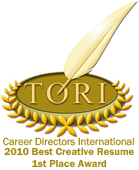 When you apply for a job, you will likely be asked to supply three or more references. How do you choose among everyone you work — or have worked — with?
When you apply for a job, you will likely be asked to supply three or more references. How do you choose among everyone you work — or have worked — with?
Who is a good reference?
A good reference is someone who can speak favorably and articulately about your skills, experience, and performance of the type of tasks you will be performing in the job you’re targeting.
Consider only professional contacts for your reference list. Professional references are current and former managers, supervisors, colleagues, clients, vendors, fellow volunteers, or professors (if you’re a recent graduate).
As a last resort, if you simply have no professional references, list a personal reference such as a friend or pastor who can vouch for your good character. Do not list relatives, no matter how much they adore you or how influential they are.
How to choose a reference
Let’s say you have several people who would make a good reference. How do you choose among them?
I. Determine your potential references
- First, make a list of all of your current and former managers, colleagues, clients, and vendors.
- Cross out the names of people who do not hold a good opinion of you.
- Delete those whose opinion you do not value.
- Omit those who do not express themselves articulately, even if they think highly of you and you respect them.
II. Match References to your target job
- Obtain a job description for your target position or a position similar to those for which you will apply.
- Now, in a separate list, write the top several requirements of your target position as they appear on the job description. Leave half a dozen blank lines between each requirement.
- Under each requirement, indicate the jobs in which you performed tasks that apply.
- Next to each job, note all Potential References (from the previous list) you worked with in each position.
- Decide which three will speak most glowingly about you regarding these specific skills and experiences. These are your references for this application.
Choose references who can speak about different requirements. Your references may not all be able to cover all of the requirements for the position, so choose references that complement each other. If one can speak to your technical skill, perhaps another can speak to your management abilities, for example.
When to choose references
Employers used to ask only candidates they interviewed for references, but recently, career professionals are hearing that more employers are requesting references from all who submit an application. That means you need to have your references ready at the same time as your resume.
If you’re not having fun choosing references, or with any other part of your job search, we need to talk. Contact me to figure out what type of guidance would serve you best. I’m well versed in resumes, cover and inquiry letters, and LinkedIn profiles for many industries. I also offer coaching for deciding on your next career direction, job search techniques, interview preparation, and salary negotiation. I specialize in people who are at once creative and analytical. If that sounds like you, we may be a good match to work together to get your job search cooking.
Related
Your Reference List: How to prepare your references
Your Reference List: Hurdling obstacles
Your Reference List: Checking your references
Photo credit: Phil Whitehouse








